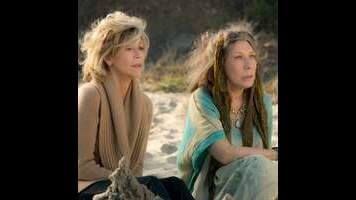But surprisingly, Grace And Frankie isn’t a contribution to the multi-cam renaissance. It’s handsomely shot single-camera dramedy, tonally akin to the hushed hilarity of HBO’s Girls and Togetherness, but with a comic sensibility better suited to the network sitcoms on which Kauffman and Morris cut their teeth. The contrast between how the show looks and how it feels is so dramatic, it’s as if Kauffman and Morris wrote a multi-cam pilot in 2005 and tried to port it to 2015 like outdated software.
Grace And Frankie’s premise is pure multi-cam throwback. The show has the sort of logline that would attract the rapt attention of TV Land, the home of new, original sitcoms that could pass for the broad, relatable fare spotlighted in ’90s nostalgia marathons. The sexuality component comes off as an attempt to insert a third rail into what would otherwise be a garden-variety take on the Odd Couple dynamic, but the idea of older, married, closeted gay men leaving their wives isn’t as provocative or dangerous as Kauffman and Morris seem to think it is. It’s also beside the point. Robert and Sol remain central parts of the show as their newly publicized relationship ripples through their unconventional family structure, but the show is about Grace and Frankie, how they find their way to a friendship and come to grips with the reality that their golden years will bear no resemblance to their retirement fantasies. Neither is thrilled with the arrangement, and their prickly relationship could anchor a fun, forgettable insult comedy.
But Grace And Frankie wants to be grander and more substantial than a sitcom trifle, and not even director Tate Taylor (The Help, Get On Up) could figure out how reconcile the show’s warring tones. In keeping with the standards of contemporary television, the show uses thoughtfully curated pop-music cues in the final beat and end credits of each episode. One of the six episodes screened for critics ends with Cat Power’s elegiac “The Greatest”; the song is beautiful, but such a downer it would be too somber a choice for many dramas, let alone a sitcom that contains jokes about an epidemic of sexually transmitted diseases among oversexed seniors. The curious soundtrack selection suggests Kauffman and Morris aren’t as interested in the jokes as much as the difficult emotional truths beneath them, and that would be fine if there weren’t quite so many jokes.
The show’s saving grace is its stellar cast. Fonda, Tomlin, Waterston, and Sheen are held in such high esteem precisely because they deliver performances capable of spackling even the most cracked, crumbling material. Fonda and Tomlin’s reunion feels right from the first frame, and their chemistry has only improved with time. Their effervescent performances have such a buoying effect on Grace And Frankie, it’s hard to write the show off as a conceptual failure even when it’s embodying one. Sheen and Waterston are also remarkable, especially Waterston, whose deft performance as Sol could serve as a tutorial on how to play an openly gay man without trying too hard or employing lazy gay stereotypes. There’s not a bad performance in Grace And Frankie, which also features skilled turns from June Diane Raphael and Ethan Embry as two of the couples’ children and Joe Morton as Frankie and Sol’s gay friend.
Grace And Frankie will make a formidable opponent come award season precisely because of its neither-fish-nor-fowl quality. The show features the punchlines and sitcom rhythms to qualify for comedy categories, but it’s more effective as a dramatic platform, allowing Fonda and Tomlin to display a breadth of range not available in many comedic roles. But Grace And Frankie works better as Emmy-bait than as a well-tuned dramedy, and it’s not built for binge-watching. Kauffman and Morris don’t have the auteurist edge of Lena Dunham or the Duplass brothers, so the show’s genre straddling comes across as confusion rather than a confident, unusual perspective. It’s kind of a shame Kauffman didn’t stick with what she knows best. The world has plenty of shows about the cruelty of aging. But a show about six retirees and their sexy misadventures in rent-controlled Manhattan apartments? Now that could be interesting.

 Keep scrolling for more great stories.
Keep scrolling for more great stories.
